中考英语易混淆词汇总结
中考英语78个易混易错单词+短语+句型(全)
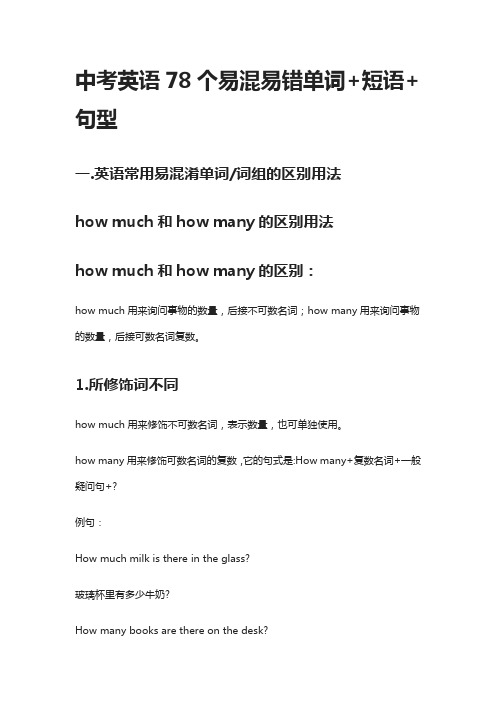
中考英语78个易混易错单词+短语+句型一.英语常用易混淆单词/词组的区别用法how much和how many的区别用法how much和how many的区别:how much用来询问事物的数量,后接不可数名词;how many用来询问事物的数量,后接可数名词复数。
1.所修饰词不同how much用来修饰不可数名词,表示数量,也可单独使用。
how many用来修饰可数名词的复数,它的句式是:How many+复数名词+一般疑问句+?例句:How much milk is there in the glass?玻璃杯里有多少牛奶?How many books are there on the desk?有多少本书在桌子上?2.用法不同How much 表示多少钱,用来问价格。
例句:How much is this dress?这个连衣裙多少钱?How many 表示多少,用来问数量。
例句:How many apples do you have?你有多少苹果?in和on的区别用法:当我们表示某些东西被其他东西所包围时使用“in”这个词。
而“on”用于描述物体被放置在其他物体上方或外部的情况。
in可表时间,表地点,表手段、方法、材料。
on表示时间、地点、方位等。
1.意思不同in:prep.在 ... 里;在 ... 地方;在 ... 期间on:prep.在 ... 之上2.用法不同in:in着重一段时间的过程,常用于重复动作或延续动作。
in表示从现在时间算起推移到将来的一段时间之后,一般与将来时态连用。
He is a layman in economics.他对经济学一窍不通。
on:表示“在物体的表面上”,只能用on的表达方式有on the next morning,on the following。
The spider is walking on the ceiling.蜘蛛在天花板上爬行。
3.侧重点不同in:表示“在其中”。
初中英语易混淆词汇总结精华(打印背诵版)
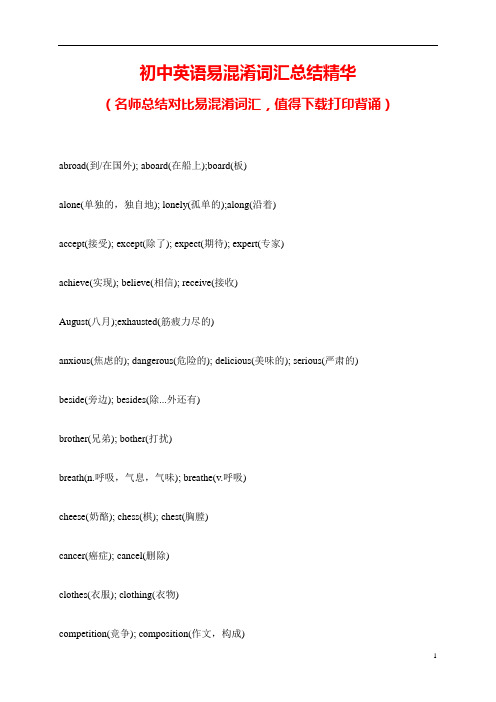
初中英语易混淆词汇总结精华(名师总结对比易混淆词汇,值得下载打印背诵)abroad(到/在国外); aboard(在船上);board(板)alone(单独的,独自地); lonely(孤单的);along(沿着)accept(接受); except(除了); expect(期待); expert(专家)achieve(实现); believe(相信); receive(接收)August(八月);exhausted(筋疲力尽的)anxious(焦虑的); dangerous(危险的); delicious(美味的); serious(严肃的) beside(旁边); besides(除...外还有)brother(兄弟); bother(打扰)breath(n.呼吸,气息,气味); breathe(v.呼吸)cheese(奶酪); chess(棋); chest(胸膛)cancer(癌症); cancel(删除)clothes(衣服); clothing(衣物)competition(竞争); composition(作文,构成)confusing(混乱的); fascinating(迷人的); frustrating(令人沮丧的);convincing(有说服力的) chop (砍); shop(商店,购物)create(创造); creative(有创造力的); creature(生物)chicken(鸡); kitchen(厨房);children(孩子)chose(选择) ; chase(追逐)costume(服装); custom(文化);customer(顾客)crow(乌鸦) ;clown(小丑); cow(奶牛)dessert(甜点); desert(沙漠)dollar(美元); similar(相似的); familiar(熟悉的); guitar(吉他)dining-room(食堂); dinning(喧闹); dinner(晚餐)dare(敢); dairy(日记); fairly(公平地); hair(头发); pair(双,对)destory(毁坏); toy(玩具); enjoy(享受,喜欢)decision(决定); direction(方向)double(两倍的); couple(夫妇)except(除了); expect(期待); accept(接受); expert(专家)expect(希望); respect(尊重)early(早地): easily(容易地)energy(能量); energetic(精力充沛的); engineer(工程师) entertainment(娱乐); environment(环境)especially(特别,尤其);particularly(格外);specially(特殊地) expensive(昂贵的);experience(经验); experiment(实验) express(表达); impress(使印象深刻); press(按压) electronic(电子的);comic(滑稽的);magic(魔术)floor(地板); flour(面粉);flower(花朵)fight(打架); flight(飞行)fruit(水果); unit(单元); guitar(吉他); guide(指导); suit(套装) great(好的);greet(打招呼)guess(猜); guest(客人)heard(听); heart(心); heat(高温) ; head(头)furniture(家具); future(未来); gesture(手势);temperature(温度); true(真的); nature(自然) hid(藏); hit(击打)hill(小山丘);hall(厅堂); kill(杀害)hold(拿住); hole(洞)instrution(指导); instrument(工具,乐器) invent(发明); invite(邀请)later(稍后); latest(最近的) ; lately(最近)lead(领导); leaf(叶子)land(陆地); lend(借给)litter(垃圾); little(小/少的); letter(信件)line(线); lion(狮子)lie-lay-lain(躺),(位于); lay-laid-laid(下蛋) march(行军); match(比赛,搭配)metal(金属); medal(奖牌); model(模型,模特) monkey(猴子); donkey(驴)national(国家的,民族的); natural(自然的) ninth(第九); ninety(第九十)offer(提供); officer(官员)outgoing(外向的); outstanding(杰出的) purpose(目的); suppose(期待)pass(通过); past(过去的); post(邮寄) plane(飞机); planet(小行星); plant(植物) pool(水池); poor(贫穷的)quite(十分,非常); quiet (安静的)regard(视为); regret(后悔)remain(保持); remind(提醒)repeat(重复); report(报道)raise(筹集); rise(上升); rose【名词】(玫瑰) rain(雨);pain(疼痛); lain(躺)seem(似乎); seen(看见)send(发送):sand(沙子)single(单个的); simple(简单的)soup(汤); soap(肥皂)sour(酸的); tour(旅游)street(街道); strict(严格的); secret(秘密)succeed(成功v.); success(成功n.)support(支持); suppose(假定); surprise(惊喜)supper(晚餐); super(超级的)tower(塔); towel(毛巾)till(直到); until(直到)value(价值); volunteer(志愿)specific(具体的); energetic(有活力的);fantastic(极好的) socks(袜子); stockings(长筒袜)stick(坚持,棍); strict(严格的)story(故事); store(商店)sweet(甜的); sweat(汗); sweep(擦) through(通过); although(尽管)。
九年级英语易混淆知识点
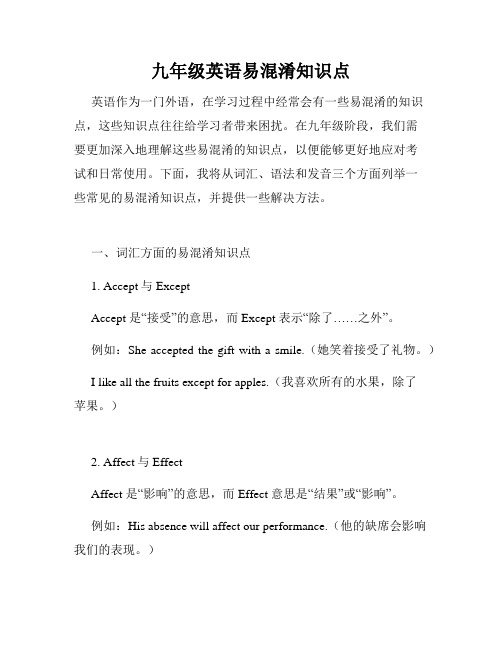
九年级英语易混淆知识点英语作为一门外语,在学习过程中经常会有一些易混淆的知识点,这些知识点往往给学习者带来困扰。
在九年级阶段,我们需要更加深入地理解这些易混淆的知识点,以便能够更好地应对考试和日常使用。
下面,我将从词汇、语法和发音三个方面列举一些常见的易混淆知识点,并提供一些解决方法。
一、词汇方面的易混淆知识点1. Accept与ExceptAccept 是“接受”的意思,而Except 表示“除了……之外”。
例如:She accepted the gift with a smile.(她笑着接受了礼物。
)I like all the fruits except for apples.(我喜欢所有的水果,除了苹果。
)2. Affect与EffectAffect 是“影响”的意思,而Effect 意思是“结果”或“影响”。
例如:His absence will affect our performance.(他的缺席会影响我们的表现。
)The medicine had a positive effect on her health.(这种药对她的健康有积极的影响。
)3. Desert与DessertDesert 是“沙漠”的意思,而Dessert 表示“甜点”。
例如:They took a trip to the desert.(他们去沙漠旅行了。
)I want some ice cream for dessert.(我想要一些冰淇淋当甜点。
)二、语法方面的易混淆知识点1. Much与ManyMuch 用于不可数名词,而Many 用于可数名词。
例如:He has much experience in this field.(他在这个领域有很多经验。
)There are many books on the shelf.(书架上有很多书。
)2. It's与ItsIt's 是 It is 或 It has 的缩写形式,而Its 是“它的”的意思。
中考英语最易混淆词汇汇总

中考英语最易混淆词汇汇总1. clothes, cloth, clothingclothes统指各种衣服,谓语动词永远是复数, cloth指布,为不可数名词clothing 服装的总称,指一件衣服用a piece of, an article of2. incident, accidentincident指小事件, accident指不幸的事故He was killed in the accident.3. amount, numberamount后接不可数名词, number后接可数名词 a number of students4. family, house, homehome 家,包括住处和家人,house房子,住宅,family家庭成员. My family is a happy one.5. sound, voice, noisesound自然界各种各样的声音,voice人的嗓音,noise噪音I hate the loud noise sutside.6. photo, picture, drawingphoto用照相机拍摄的照片,picture可指相片,图片,电影片,drawing画的画Let's go and see a goodpicture.7. vocabulary, wordvocabulary词汇,一个人拥有的单词量,word具体的单词He has a large vocabulary.8. population, peoplepopulation人口,人数,people具体的人 China has a large population.9. weather, climateweather一天内具体的天气状况,climate长期的气候状况The climate here is not good for you.10. road, street, path, wayroad具体的公路,马路,street街道,path小路,小径, way道路,途径take this road; in the street, show me the way to the museum.11. course, subjectcourse课程(可包括多门科目),subject科目(具体的学科)a summer course12. custom, habitcustom传统风俗,习俗,也可指生活习惯,后接to do, habit生活习惯,习惯成自然,后接of doing. I've got the habit ofdrinking a lot.13. cause, reasoncause 指造成某一事实或现象的直接原因,后接ofsth./doing sth,reason用来解释某种现象或结果的理由,后接for sth./doing sth. the reason for being late14. exercise, exercises, practiceexercise运动,锻炼(不可数),exercises练习(可数), practice(反复做的)练习 Practice makesperfect.15. class, lesson作"课"解时,两者可以替换.指课文用lesson. 指班级或全体学生用class. lesson 6; class 516. speech, talk, lecturespeech指在公共场所所做的经过准备的较正式的演说,talk日常生活中的一般的谈话,讲话,lecture学术性的演讲, 讲课 a series of lecture on…17. officer, officialofficer部队的军官,official政府官员 an armyofficer18. work, job二者均指工作。
初中英语易错词汇

初中英语易错词汇1.affect 和effect:常被误用。
affect是动词,意为“影响”;effect是名词,意为“效果”或“影响”。
2.advice 和advise:advice是名词,意为“建议”;advise是动词,意为“建议”。
3.between 和among:between用于两者之间,among用于三者或三者以上之间。
4.borrow 和lend:borrow意为“借入”,lend意为“借出”。
5.bring 和take:bring意为“带来”,take意为“带走”。
6.can 和may:can表示能力或可能性,may表示许可或可能。
7.few 和little:few修饰可数名词,little修饰不可数名词。
8.healthy 和healthily:healthy是形容词,healthily是副词。
9.its 和it's:its是形容词性物主代词,it's是it is的缩写。
10.know 和knew:know是现在时,knew是过去时。
11.lie 和lay:lie是不及物动词,意为“躺”;lay是及物动词,意为“放置”。
12.lose 和miss:lose意为“丢失”,miss意为“想念”或“错过”。
13.noise 和voice:noise是噪音,voice是人的声音。
14.pass 和past:pass是动词,past是介词或副词。
15.problem 和question:problem指需要解决的问题,question指问题或疑问。
16.quiet 和quite:quiet是形容词,意为“安静的”;quite是副词,意为“非常”。
17.receive 和accept:receive指收到,accept指接受。
18.say 和speak:say强调说话内容,speak强调说话动作。
19.since 和for:since与时间点连用,for与时间段连用。
20.some time 和sometime:some time表示一段时间,sometime表示某个时候。
中考英语易混淆词汇组总结
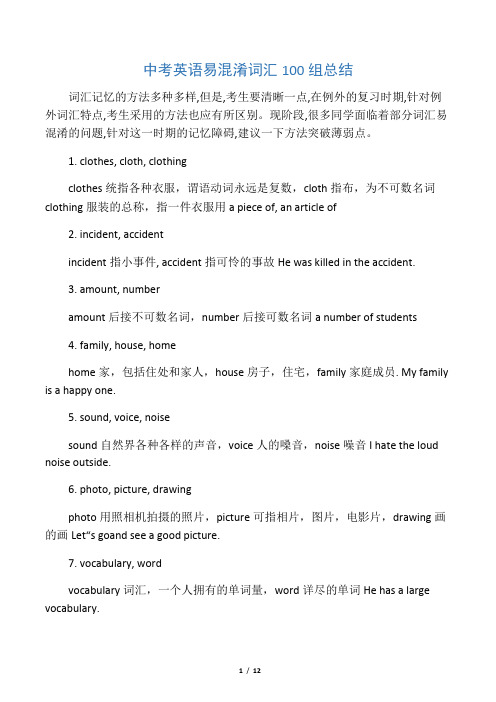
中考英语易混淆词汇100组总结词汇记忆的方法多种多样,但是,考生要清晰一点,在例外的复习时期,针对例外词汇特点,考生采用的方法也应有所区别。
现阶段,很多同学面临着部分词汇易混淆的问题,针对这一时期的记忆障碍,建议一下方法突破薄弱点。
1. clothes, cloth, clothingclothes统指各种衣服,谓语动词永远是复数,cloth指布,为不可数名词clothing服装的总称,指一件衣服用a piece of, an article of2. incident, accidentincident指小事件, accident指可怜的事故He was killed in the accident.3. amount, numberamount后接不可数名词,number后接可数名词a number of students4. family, house, homehome家,包括住处和家人,house房子,住宅,family家庭成员. My family is a happy one.5. sound, voice, noisesound自然界各种各样的声音,voice人的嗓音,noise噪音I hate the loud noise outside.6. photo, picture, drawingphoto用照相机拍摄的照片,picture可指相片,图片,电影片,drawing画的画Let“s goand see a good picture.7. vocabulary, wordvocabulary词汇,一个人拥有的单词量,word详尽的单词He has a large vocabulary.8. population, peoplepopulation人口,人数,people详尽的人China has a large population.9. weather, climateweather一天内详尽的天气状况,climate长期的气候状况The climate here is not good foryou.10. road, street, path, wayroad详尽的公路,马路,street街道,path小路,小径,way道路,途径take this road; in the street, show me the way to the museum.11. course, subjectcourse课程(可包括多门科目),subject科目(详尽的学科)a summer course12. custom, habitcustom传统风俗,习俗,也可指生活习惯,后接to do,habit生活习惯,习惯成自然,后接of doing. I“ve got the habit of drinking a lot.13. cause, reasoncause指造成某一事实或现象的直接原因,后接of sth./doing sth,reason用来解释某种现象或结果的理由,后接for sth./doing sth. the reason for being late14. exercise, exercises, practiceexercise运动,锻炼(不可数),exercises练习(可数),practice(反复做的)练习Practicemakes perfect.15. class, lesson作“课“解时,两者可以替换.指课文用lesson.指班级或全体学生用class. lesson 6; class 516. speech, talk, lecturespeech指在公共场所所做的经过准备的较正式的演说,talk日常生活中的大凡的谈话,讲话,lecture学术性的演讲,讲课a series of lecture on…17. officer, officialofficer部队的军官,official政府官员an army officer18. work, job二者均指工作。
中考易混淆单词
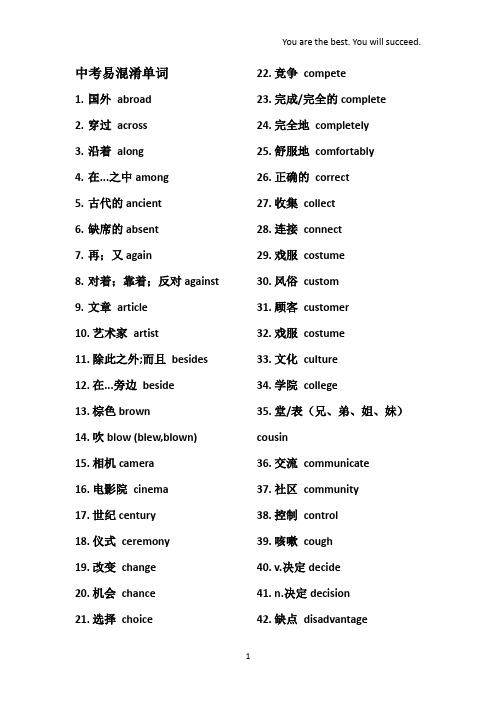
You are the best. You will succeed.中考易混淆单词1.国外abroad2.穿过across3.沿着along4.在...之中among5.古代的ancient6.缺席的absent7.再;又again8.对着;靠着;反对against9.文章article10.艺术家artist11.除此之外;而且besides12.在...旁边beside13.棕色brown14.吹blow (blew,blown)15.相机camera16.电影院cinema17.世纪century18.仪式ceremony19.改变change20.机会chance21.选择choice 22.竞争compete23.完成/完全的complete24.完全地completely25.舒服地comfortably26.正确的correct27.收集collect28.连接connect29.戏服costume30.风俗custom31.顾客customer32.戏服costume33.文化culture34.学院college35.堂/表(兄、弟、姐、妹)cousin36.交流communicate37.社区community38.控制control39.咳嗽cough40.v.决定decide41.n.决定decision42.缺点disadvantageYou are the best. You will succeed.43.挖dig(dug, dug)44.邀请invite45.发明invent46.邀请invitation47.发明invention48.分开divide49.电electricity50.电的electric51.电子的elcetronic52.实验experiment53.经验;经历experience54.尤其;特别especially55.确切地exactly56.极好的;优秀的excellent57.除了except58.期望expect59.表达express60.表现behave61.表扬perform62.渔夫fisherman63.第四fourth64.十四fourteen 65.第四十fortieth66.法语/法国人的French67.法国France68.外国人foreigner69.花园garden70.地理geography71.毕业graduate72.逐渐地gradually73.大体的general74.客人guest75.门卫;士兵guard76.导游guide77.德语/德国人的German78.德国Germany79.习惯habit80.爱好hobby81.幽默的humorous82.高度height83.重量weight84.加热heat85.心脏heart86.拥抱hug(hugged,hugged)87.隐藏hide(hid,hidden)88.放;下(蛋)lay( laid, laid)89.躺lie (lay, lain)90.撒谎(lied,lied)91.邀请invite92.发明invent93.产业;工业industry94.面试;采访interview95.介绍introduction96.指示;指令instruction97.立刻immediately98.日语/日本人的Japanese99.模型model100.中间的middle101.嘴巴mouth102.月month103.老鼠mouse104.钱money105.猴子monkey106.奖牌medal107.铁的metal108.精神上的mental 109.医学的medical110.药medicine111.机器machine112.材料material113.第九ninth114.九十ninety115.(两者)都不neither 116.(三者以上)都不none 117.第九十ninetieth 118.乘客passenger119.段落/走廊passage 120.合适地properly121.可能地possibly122.可能地probably123.承诺promise124.产品product125.英镑pound126.骄傲的proud127.骄傲n. pride128.小学生pupil129.紫色purple130.价格price131.奖品prize132.表扬;赞扬praise 133.星球planet134.种植/植物plant 135.荣幸;快乐pleasure 136.完美的perfect 137.耐心的patient 138.有礼貌的polite 139.飞行员pilot140.准备prepare 141.更喜欢prefer 142.预防prevent 143.保护protect144.污染pollute145.生产v. produce 146.过程n.process 147.十分quite148.安静的quiet 149.收到receive150.意识到realize 151.提醒remind152.复习,回顾review 153.害怕的(形容人)scared 154.害怕的(形容物)scary 155.酸的sour156.咸的salty157.糖sugar158.卖;销售n.sale159.卖;销售V.sell160.v.服务serve161.n.服务service162.n.仆人servant163.围巾scarf164.分离separate165.小吃,零食snack 166.蛇snake167.标准standard168.严格的strict169.严肃的,认真的serious 170.象征symbol171.标志sign172.社会society173.社会的social174.偷steal(stole, stolen)175.摇晃shake(shook,shaken) 176.传播spread177.速度speed178.猜想;设想suppose 179.支持support180.建议suggest181.成功v.succeed182.成功n.success183.通过through184.虽然though/although 185.扔throw (threw, thrown) 186.周二Tuesday187.周四Thursday188.十三thirteen189.三十thirty190.十二twelve191.第十二twelfth192.朝;向toward(s)=to 193.向前forward194.厕所toilet195.珍宝treasure196.雨伞umbrella 197.大学university 198.参观者visitor 199.视频;录像video 200.周三Wednesday 201.天气weather 202.是否whether。
中考易拼错单词

中考易拼错单词
一、accommodation [əˌkɒməˈdeɪʃn],名词。
1. 含义:住宿;膳宿。
2. 易错点:容易少写一个“m”或者把“c”和“m”的顺序弄混。
二、embarrassed [ɪmˈbærəst],形容词。
1. 含义:感到尴尬的;难堪的。
2. 易错点:容易写成“embarrass”(动词)或者拼写时少字母,如写成“embarased”。
三、separate。
- 作动词 [ˈsepəreɪt]:分离;分开。
- 作形容词 [ˈseprət]:单独的;分开的。
1. 易错点:作动词时,容易忘记“a”后面的“r”;作形容词时,容易与动词形式混淆。
四、believe [bɪˈliːv],动词。
1. 含义:相信;认为。
2. 易错点:容易写成“beleive”,将“ie”顺序弄反。
五、receive [rɪˈsiːv],动词。
1. 含义:收到;接到。
2. 易错点:容易写成“recieve”,把“ei”顺序写错。
六、necessary [ˈnesəsəri],形容词。
1. 含义:必要的;必需的。
2. 易错点:容易写成“neccessary”,多写一个“c”。
七、government [ˈɡʌvənmənt],名词。
1. 含义:政府。
2. 易错点:容易写成“goverment”,少写一个“n”。
中考常见易混淆英语单词

中考常见易混淆英语单词1.worth, worthy 与worthwhileworth价值,可贵之处,作形容词时与worthy和worthwhile都是“值得……”的意思,但用法不同,如:This book is worth reading./This book is worth 3 yuan?./It s wort hwhile to visit (visiting) thisplace./This place is worthy of a visit (visiting ).worth只作表语,它后面一般接动名词,也可接名词,但只限于钱数,不接不定式。
如果用不定式或动名词作主语,则要用It s worthwhile…结构,把不定式、动名词放在句末;worthy是形容词,worthy可作表语,也可作定语,作表语时,后跟of接名词或动名词,也可以接不定式。
worthwhile和worth虽均有“值得的”意思,worth只作表语,用于be worth sth.短语中,如:It s worth the trouble.麻烦一点值得。
This watch is worth this much money.这块手表值这么多钱;而worthwhile意为“值得一做的(worth doing)”,既可作表语,如:T hese results were not worthwhile.也可用作定语。
2.rise 与 raise这两个词虽不同义,但因意义上有联系而易被混淆。
rise 上升,上涨,起床,站立。
含义较广,总的意思是指依次上升,如自然界的日、月、星、雾、云的上升,人体从睡、跪、坐、躺等姿势站立起来等。
该词为不及物动词,其过去式与过去分词分别是rose 和 risen。
例如:The sun rises in the east and sets in the west.日出于东而落于西。
/ Prices rise every day in those countries.那些国家里的物价天天上涨。
中考英语易混词汇辨析
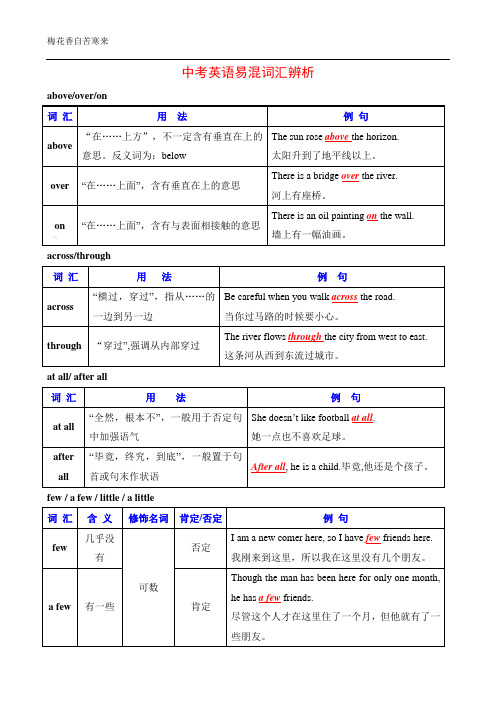
中考英语易混词汇辨析above/over/on词汇用法例句above “在……上方”,不一定含有垂直在上的意思。
反义词为:belowThe sun rose above the horizon.太阳升到了地平线以上。
over “在……上面”,含有垂直在上的意思There is a bridge over the river. 河上有座桥。
on“在……上面”,含有与表面相接触的意思There is an oil painting on the wall. 墙上有一幅油画。
across/through词汇用法例句across “横过,穿过”,指从……的一边到另一边Be careful when you walk across the road.当你过马路的时候要小心。
through“穿过”,强调从内部穿过The river flows through the city from west to east. 这条河从西到东流过城市。
at all/ after all词汇用法例句at all “全然,根本不”,一般用于否定句中加强语气She doesn’t like football at all.她一点也不喜欢足球。
after all “毕竟,终究,到底”,一般置于句首或句末作状语After all, he is a child.毕竟,他还是个孩子。
few / a few / little / a little词汇含义修饰名词肯定/否定例句few 几乎没有可数否定I am a new comer here, so I have few friends here.我刚来到这里,所以我在这里没有几个朋友。
a few 有一些肯定Though the man has been here for only one month, he has a few friends.尽管这个人才在这里住了一个月,但他就有了一些朋友。
中考英语之易混淆词汇知识点辨析
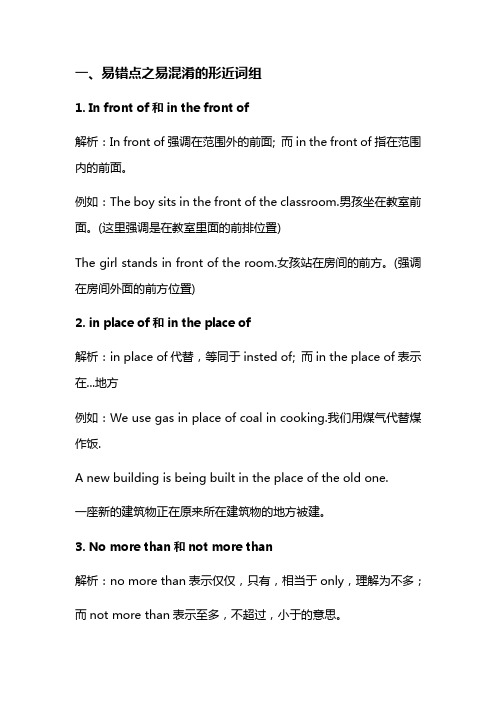
一、易错点之易混淆的形近词组1.In front of和in the front of解析:In front of强调在范围外的前面; 而in the front of指在范围内的前面。
例如:The boy sits in the front of the classroom.男孩坐在教室前面。
(这里强调是在教室里面的前排位置)The girl stands in front of the room.女孩站在房间的前方。
(强调在房间外面的前方位置)2.in place of和in the place of解析:in place of代替,等同于insted of; 而in the place of表示在...地方例如:We use gas in place of coal in cooking.我们用煤气代替煤作饭.A new building is being built in the place of the old one.一座新的建筑物正在原来所在建筑物的地方被建。
3.No more than和not more than解析:no more than表示仅仅,只有,相当于only,理解为不多;而not more than表示至多,不超过,小于的意思。
例如:He is no more than an ordinary English teacher. 他只不过是个普通的英文老师。
He has not more than three children. 他最多3 个孩子(有或许还不到三个)4.On earth和on the earth解析:两者都有在地上,在地球上的意思,但on earth还有到底,究竟的意思;On the earth只是单纯的表示在地上,在地球上例如:where on earth did you spring from?你究竟从哪里冒出来的?What if there was no lead on the earth at all?如果地球上根本就没有铅这种物质怎么办?5.At all和after all解析:at all表示根本,全然的意思,常用短语not at all表示一点也不;after all表示到底,毕竟的意思例如:I don't know him at all. 我根本不认识他。
初中易混单词

初中易混单词1. affect/effect- affect是动词,意为"影响"- effect是名词,意为"结果,影响"2. their/there/they're- their是形容词,意为"他们的"- there是副词,意为"那里"- they're是缩写形式,意为"他们是"3. accept/except- accept是动词,意为"接受"- except是介词,意为"除了"4. lose/loose- lose是动词,意为"丢失"- loose是形容词,意为"宽松的"5. to/too/two- to是介词,用于表示目的或方向- too是副词,意为"也,过于"- two是数字,意为"二"6. principal/principle- principal是名词,意为"校长"- principle是名词,意为"原则"7. affectation/affection- affectation是名词,意为"做作,矫揉造作" - affection是名词,意为"感情,喜爱"8. quiet/quite- quiet是形容词,意为"安静的"- quite是副词,意为"相当,完全"9. advice/advise- advice是名词,意为"建议"- advise是动词,意为"建议"10. whose/who's- whose是代词,意为"谁的"- who's是缩写形式,意为"谁是"。
中考易混淆单词词组汇总
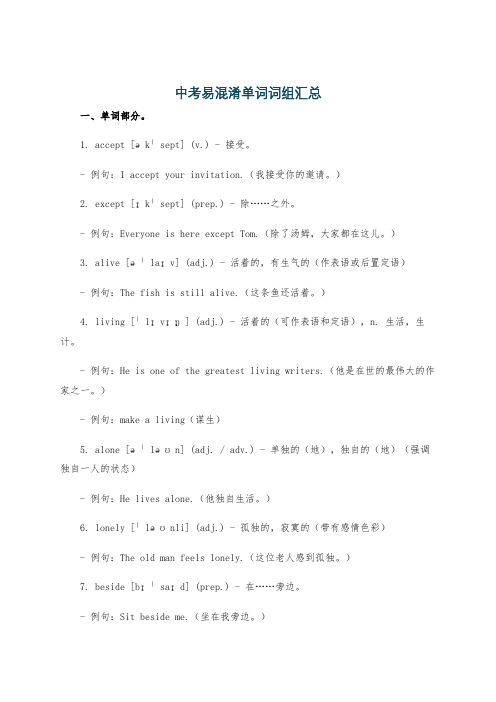
中考易混淆单词词组汇总一、单词部分。
1. accept [əkˈsept] (v.) - 接受。
- 例句:I accept your invitation.(我接受你的邀请。
)2. except [ɪkˈsept] (prep.) - 除……之外。
- 例句:Everyone is here except Tom.(除了汤姆,大家都在这儿。
)3. alive [əˈlaɪv] (adj.) - 活着的,有生气的(作表语或后置定语)- 例句:The fish is still alive.(这条鱼还活着。
)4. living [ˈlɪvɪŋ] (adj.) - 活着的(可作表语和定语),n. 生活,生计。
- 例句:He is one of the greatest living writers.(他是在世的最伟大的作家之一。
)- 例句:make a living(谋生)5. alone [əˈləʊn] (adj. / adv.) - 单独的(地),独自的(地)(强调独自一人的状态)- 例句:He lives alone.(他独自生活。
)6. lonely [ˈləʊnli] (adj.) - 孤独的,寂寞的(带有感情色彩)- 例句:The old man feels lonely.(这位老人感到孤独。
)7. beside [bɪˈsaɪd] (prep.) - 在……旁边。
- 例句:Sit beside me.(坐在我旁边。
)8. besides [bɪˈsaɪdz] (prep. / adv.) - 除……之外(还有),此外。
- 例句:Besides English, we also learn French.(除了英语,我们还学法语。
)- 例句:I don't like this dress. Besides, it's too expensive.(我不喜欢这条裙子。
它太贵了。
中考英语易混淆词汇总结
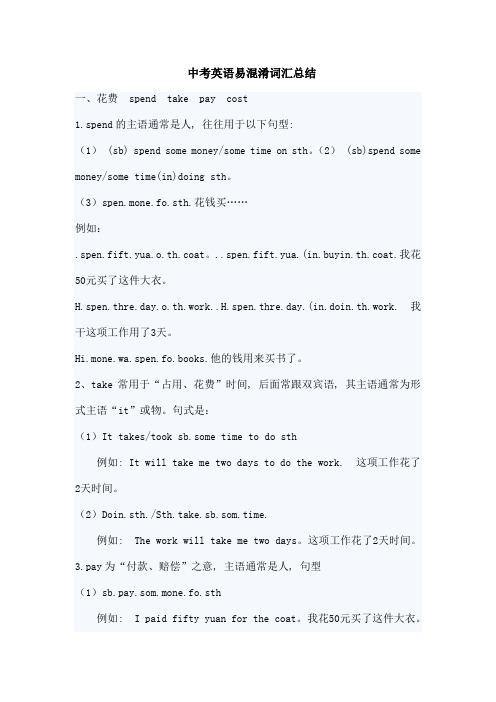
中考英语易混淆词汇总结一、花费 spend take pay cost1.spend的主语通常是人, 往往用于以下句型:(1) (sb) spend some money/some time on sth。
(2) (sb)spend some money/some time(in)doing sth。
(3)spen.mone.fo.sth.花钱买……例如:.spen.fift.yua.o.th.coat。
..spen.fift.yua.(in.buyin.th.coat.我花50元买了这件大衣。
H.spen.thre.day.o.th.work..H.spen.thre.day.(in.doin.th.work.我干这项工作用了3天。
Hi.mone.wa.spen.fo.books.他的钱用来买书了。
2、take常用于“占用、花费”时间, 后面常跟双宾语, 其主语通常为形式主语“it”或物。
句式是:(1)It takes/took sb.some time to do sth例如: It will take me two days to do the work. 这项工作花了2天时间。
(2)Doin.sth./Sth.take.sb.som.time.例如: The work will take me two days。
这项工作花了2天时间。
3.pay为“付款、赔偿”之意, 主语通常是人, 句型(1)sb.pay.som.mone.fo.sth例如: I paid fifty yuan for the coat。
我花50元买了这件大衣。
(2)pa.(sb..mone.fo.sth.付钱(给某人)买……。
例如:.hav.t.pa.the.2.pound.fo.thi.roo.eac.month.我每个月要付20英磅的房租。
(3)pay money back 还钱。
(4)例如: Ma..borro.1.yua.fro.yo.I'l.pa.i.bac.nex.week.你能借给我12块钱吗?下周还你。
九年级常考的易混淆词汇,短语及句型辨析汇总(一)
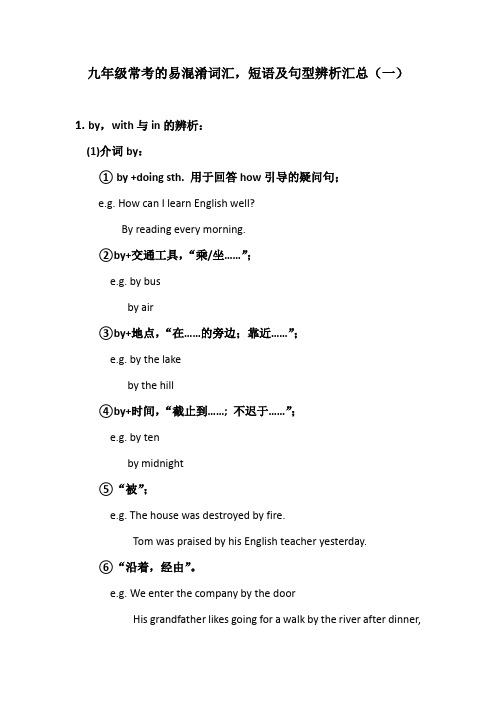
九年级常考的易混淆词汇,短语及句型辨析汇总(一)1. by,with与in的辨析:(1)介词by:① by +doing sth. 用于回答how引导的疑问句;e.g. How can I learn English well?By reading every morning.②by+交通工具,“乘/坐……”;e.g. by busby air③by+地点,“在……的旁边;靠近……”;e.g. by the lakeby the hill④by+时间,“截止到……; 不迟于……”;e.g. by tenby midnight⑤“被”;e.g. The house was destroyed by fire.Tom was praised by his English teacher yesterday.⑥“沿着,经由”。
e.g. We enter the company by the doorHis grandfather likes going for a walk by the river after dinner,⑦常用的短语:by the way 顺便问一下by accident= by chance 偶然地by mistake 错误地one by one 一个接一个step by step 一步一步地little by little 逐渐地by the time 到……为止by oneself 独自地shake sb. by the hand 和某人握手(2)with的用法:表示用某种工具。
with +工具;with+人体部位。
e.g. We like to write with a pen.We see with our eyes.(3) in的用法:通常与“语言、衣着、声音、书写材料”等名称连用。
e.g. in English用英语in ink用墨水speak in a loud voice大声地讲in red 穿红色的衣服2. so/ such…that… 的用法辨析:(1)“如此……以至于……”,引导的结果状语从句句型有:①so +形容词/副词+that 从句;②so+形容词+ a / an +单数名词+that 从句;③such+ a / an + (形容词)+单数名词+that 从句;④such +(形容词)+复数名词/ 不可数名词+ that从句。
英语中考易混淆单词与词组
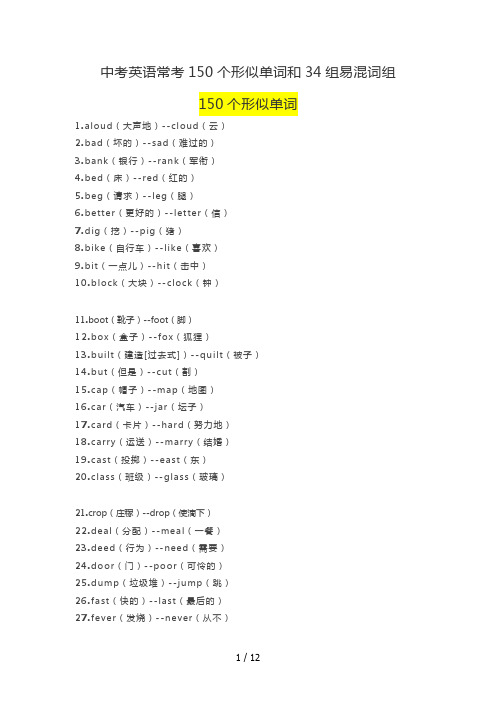
中考英语常考150个形似单词和34组易混词组150个形似单词1.aloud(大声地)--cloud(云)2.bad(坏的)--sad(难过的)3.bank(银行)--rank(军衔)4.bed(床)--red(红的)5.beg(请求)--leg(腿)6.better(更好的)--letter(信)7.dig(挖)--pig(猪)8.bike(自行车)--like(喜欢)9.bit(一点儿)--hit(击中)10.block(大块)--clock(钟)11.boot(靴子)--foot(脚)12.box(盒子)--fox(狐狸)13.built(建造[过去式])--quilt(被子)14.but(但是)--cut(割)15.cap(帽子)--map(地图)16.car(汽车)--jar(坛子)17.card(卡片)--hard(努力地)18.carry(运送)--marry(结婚)19.cast(投掷)--east(东)20.class(班级)--glass(玻璃)21.crop(庄稼)--drop(使滴下)22.deal(分配)--meal(一餐)23.deed(行为)--need(需要)24.door(门)--poor(可怜的)25.dump(垃圾堆)--jump(跳)26.fast(快的)--last(最后的)27.fever(发烧)--never(从不)28.fire(解雇)--hire(雇用)29.fish(鱼)--wish(希望)30.five(五)--live(生活)31.fix(安装)--mix(混和)32.fool(愚蠢的)--pool(小池)33.grade(年级)--trade(贸易)34.grain(谷物)--train(火车)35.hide(躲藏)--ride(骑)36.hot(热的)--not(不)37.house(房子)--mouse(老鼠)38.into(到……里面)--onto(到……上面)39.jeep(吉普车)--keep(保持)40.just(恰好)--must(必须)41.kick(踢)--pick(捡)42.kind(种类)--mind(介意)43.kiss(吻)--miss(错过)ter(后来)--water(水)45.lest(唯恐)--rest(休息)46.lid(盖子)--rid(去掉)47.life(生命)--wife(妻子)48.love(喜爱)--move(移动)49.mail(邮件)--rail(铁轨)50.meal(一餐)--real(真正的)51.mine(我的)--nine(九)52.moon(月亮)--soon(不久)53.most(最多的)--post(邮局)54.mouth(嘴)--south(南)55.much(许多)--such(这样的)56.next(下一个)--text(课文)57.north(北)--worth(值得……的)58.pork(猪肉)--work(工作)59.push(推)--rush(冲)60.reason(原因)--season(季节)61.ring(响)--wing(翅膀)62.sea(海洋)--tea(茶)63.sorry(难过的)--worry(使担忧)64.talk(谈话)--walk(散步)65.taste(品尝)--waste(浪费)66.bad(坏的)--bed(床)67.bat(球拍)--bit(一点儿)--but(但是)68.beg(请求)--big(大的)69.coal(煤)--cool(凉的)70.dead(死的)--deed(行为)71.dear(亲爱的)--deer(鹿)72.dig(挖)--dog(狗)--dug(dig 的过去和过去分词)73.fall 落下--fill 装满--full 满的74.fan(扇子)--fun(玩笑)75.farm(农场)--form(建立)76.fix(安装)--fox(狐狸)77.glass(玻璃)--grass(草地)78.hare 野兔--here 在这里--hire(雇用)ke(湖)--like(喜欢)ke(湖)--lame 跛的--late(迟的)st(最后的)--lost(丢失的)82.live(生活)--love(喜爱)83.meat(肉)--meet(遇见)84.month(月份)--mouth(嘴)(网)--not(不)86.new(新的)--now(现在)87.nine(九)--none(没有人)88.police(警察)--polite(有礼貌的)89.quiet(安静的)--quite(很)90.red(红色的)--rid(去掉)91.ride(骑)--rise(升高)92.rise(升高)--rose(玫瑰花)93.same(同一的)--some(一些)94.set(安置)--sit(坐)95.ship(轮船)--shop(商店)96.shirt(衬衫)--skirt(裙子)97.shy 害羞的--sky 天空--spy(间谍)98.sing(唱)--song(歌曲)99.son(儿子)--sun(太阳)100.test(测验)--text(课文)101.thank(谢谢)--think(思考)102.track(足迹)--truck(卡车)103.wall(墙)--will(将要)104.wash(洗)--wish(希望)105.win 获胜--won(win 过去式/分词)106.and(和)--ant(蚂蚁)--any 任何的)107.bed(床)--bee(蜜蜂)--beg 请求)108.book(书)--boot(靴子)109.box(盒子)--boy(男孩)110.bread(面包)--break(打破)111.bus(公共汽车)--but(但是)112.can 能够--cap 帽子--car 汽车--cat 113.clean(干净的)--clear(清楚的)114.cook(烹调)--cool(凉的)115.cup(小茶杯)--cut(切)116.deed(行为)--deer(鹿)117.dig(挖)--dip(浸)118.find(发现)--fine(美好的)119.fit(适合)--fix(修理)120.food(食物)--foot(脚)121.guess(猜)--guest(客人)122.hand(手)--hang(挂)123.hard(努力地)--hare(野兔)124.head 头--hear 听--heat 热)125.hen(母鸡)--her(她的)--hey([口语]嗨)126.him(he 的宾格)--hit(击中)127.hold(抓住)--hole(洞)128.is(是)--it(它)129.job(工作)--joy(欢乐)130.kind(种类)--king(国王)me(跛的)--lamp(灯)132.leg(腿)--let(让)133.meal(餐)--mean(意思是)134.mind(介意)--mine(我的)135.nod 点头--nor 也不--not 不136.park(公园)--part(部分)137.pass(传递)--past(经过)138.plan(计划)--play(玩)139.plane(飞机)--plant(植物)140.pool(水池)--poor(可怜的)141.rice(大米)--rich(富的)142.sale(卖)--salt(盐)143.sea(海洋)--see(看见)144.sit(坐)--six(六)145.talk(谈话)--tall(高的)146.up(向上)--us(we 的宾格)147.warm(温暖的)--warn(告诫)148.word(词)--work(工作)149.proud(骄傲)--pound(英镑)150.goose(鹅)--geese(鹅复数)34组形近词组1. a number of,the number ofa number of 许多,谓语动词用复数;the number of …的数目,谓语动词用单数。
易混淆英语词汇

易混淆英语词汇一、accept([əkˈsept],动词)和except([ɪkˈsept],介词/连词)1. accept.- 意思:接受;认可。
例如:I accept your invitation.(我接受你的邀请。
)2. except.- 意思:除……之外。
例如:Everyone went to the party except Tom.(除了汤姆,每个人都去参加聚会了。
)二、affect([əˈfekt],动词)和effect([ɪˈfekt],名词;[ɪˈfekt],动词)1. affect.- 意思:影响;使感动。
例如:The bad weather affected our trip.(恶劣的天气影响了我们的旅行。
)2. effect(名词)- 意思:影响;效果。
例如:The medicine has a good effect on my illness.(这种药对我的病有很好的效果。
)- effect(动词)- 意思:使发生;实现。
例如:The new policy will effect great changes in our company.(新政策将使我们公司发生巨大的变化。
)三、advice([ədˈvaɪs],名词)和advise([ədˈvaɪz],动词)1. advice.- 意思:建议;劝告(是不可数名词)。
例如:Can you give me some advice?(你能给我一些建议吗?)2. advise.- 意思:建议;劝告。
例如:I advise you to study hard.(我建议你努力学习。
)四、beside([bɪˈsaɪd],介词)和besides([bɪˈsaɪdz],介词/副词)1. beside.- 意思:在……旁边。
例如:He sat beside me.(他坐在我旁边。
)2. besides(介词)- 意思:除……之外(还有)。
中考易混淆英语词组详细解析
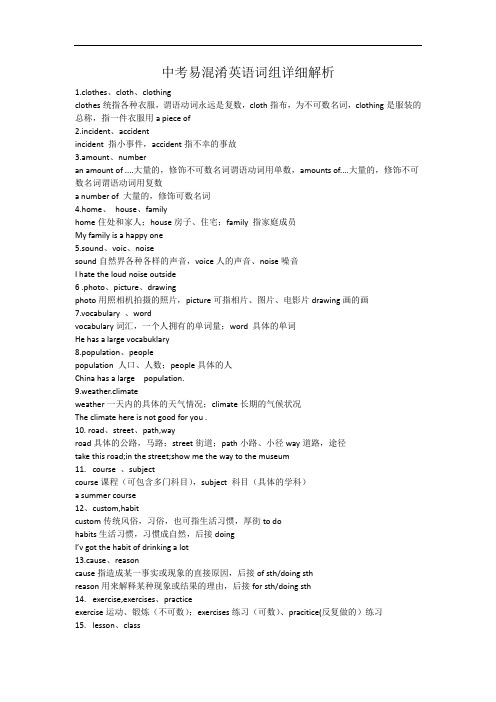
中考易混淆英语词组详细解析1.clothes、cloth、clothingclothes统指各种衣服,谓语动词永远是复数,cloth指布,为不可数名词,clothing是服装的总称,指一件衣服用a piece of2.incident、accidentincident 指小事件,accident指不幸的事故3.amount、numberan amount of ....大量的,修饰不可数名词谓语动词用单数,amounts of....大量的,修饰不可数名词谓语动词用复数a number of 大量的,修饰可数名词4.home、house、familyhome住处和家人;house房子、住宅;family 指家庭成员My family is a happy one5.sound、voic、noisesound自然界各种各样的声音,voice人的声音、noise噪音I hate the loud noise outside6 .photo、picture、drawingphoto用照相机拍摄的照片,picture可指相片、图片、电影片drawing画的画7.vocabulary 、wordvocabulary词汇,一个人拥有的单词量;word 具体的单词He has a large vocabuklary8.population、peoplepopulation 人口、人数;people具体的人China has a large population.9.weather.climateweather一天内的具体的天气情况;climate长期的气候状况The climate here is not good for you .10. road、street、path,wayroad具体的公路,马路;street街道;path小路、小径way道路,途径take this road;in the street;show me the way to the museum11.course 、subjectcourse课程(可包含多门科目),subject 科目(具体的学科)a summer course12、custom,habitcustom传统风俗,习俗,也可指生活习惯,厚街to dohabits生活习惯,习惯成自然,后接doingI’v got the habit of drinking a lot13.cause、reasoncause指造成某一事实或现象的直接原因,后接of sth/doing sthreason用来解释某种现象或结果的理由,后接for sth/doing sth14.exercise,exercises、practiceexercise运动、锻炼(不可数);exercises练习(可数)、pracitice(反复做的)练习15.lesson、class作“课”解释时,两者可以替换。
- 1、下载文档前请自行甄别文档内容的完整性,平台不提供额外的编辑、内容补充、找答案等附加服务。
- 2、"仅部分预览"的文档,不可在线预览部分如存在完整性等问题,可反馈申请退款(可完整预览的文档不适用该条件!)。
- 3、如文档侵犯您的权益,请联系客服反馈,我们会尽快为您处理(人工客服工作时间:9:00-18:30)。
中考英语易混淆词汇总结一、花费spend take pay cost1、spend的主语通常是人,往往用于以下句型:(1)(sb) spend some money/some time on sth。
(2)(sb)spend some money/some time(in)doing sth。
(3)spend money for sth. 花钱买……例如:I spent fifty yuan on the coat。
= I spent fifty yuan (in) buying the coat. 我花50元买了这件大衣。
He spent three days on the work. = He spend three days (in) doing the work. 我干这项工作用了3天。
His money was spent for books. 他的钱用来买书了。
2、take常用于“占用、花费”时间,后面常跟双宾语,其主语通常为形式主语“it”或物。
句式是:(1)It takes/took sb.some time to do sth例如:It will take me two days to do the work.这项工作花了2天时间。
(2)Doing sth./Sth.takes sb.some time.例如:The work will take me two days。
这项工作花了2天时间。
3、pay为“付款、赔偿”之意,主语通常是人,句型(1)sb. pays some money for sth例如:I paid fifty yuan for the coat。
我花50元买了这件大衣。
(2)pay (sb.) money for sth. 付钱(给某人)买……。
例如:I have to pay them 20 pounds for this room each month. 我每个月要付20英磅的房租。
(3)pay money back 还钱。
例如:May I borrow 12 yuan from you? I'll pay it back next week. 你能借给我12块钱吗?下周还你。
(4)pay off one's money还清钱。
例如:I will pay off your money as quickly as I can.我会尽快还清你的钱。
4、cost的主语是物或某种活动,还可以表示“值”。
句型:(1)sth. costs (sb。
) +money,某物花了(某人)多少钱。
例如:A new computer costs a lot of money. 买一台新电脑要花一大笔钱。
(2)(doing) sth. costs (sb。
) +time,某物(做某事)花了(某人)多少时间。
例如:Remembering these new words cost him a lot of time. 他花了大量时间才记住了这些单词。
注意:cost的过去式及过去分词都是cost,并且不能用于被动句。
北京市海淀区中考试题I'm interested in animals, so I _____________ every Saturday working in an animal hospital。
A. payB. getC. takeD. spend【解析】答案:D。
该题考查的是pay, get, take和spend这四个动词的用法区别。
只有动词spend可以用在sb. spends time doing sth. 这个句型里,所以正确答案应是spend。
This science book ____ me a great amount of money。
A. tookB. costC. usedD. spent答案:B1.clothes, cloth, clothingclothes统指各种衣服,谓语动词永远是复数,cloth指布,为不可数名词,clothing 服装的总称,指一件衣服用a piece of, an article of2. incident, accidentincident指小事件, accident指不幸的事故He was killed in the accident.3. amount, numberamount后接不可数名词,number后接可数名词a number of students4. family, house, homehome 家,包括住处和家人,house房子,住宅,family家庭成员. My family is a happy one.5. sound, voice, noisesound自然界各种各样的声音,voice人的嗓音,noise噪音I hate the loud noise outside.6. photo, picture, drawingphoto用照相机拍摄的照片,picture可指相片,图片,电影片,drawing画的画Let's go and seea good picture.7. vocabulary, wordvocabulary词汇,一个人拥有的单词量,He has a large vocabulary. word具体的单词8. population, peoplepopulation人口,人数,people具体的人China has a large population.9. weather, climateweather一天内具体的天气状况,climate长期的气候状况The climate here is not good for you.10.road, street, path, wayroad具体的公路,马路,street街道,path小路,小径,way道路,途径take this road; in the street, show me the way to the museum.11. course, subjectcourse课程(可包括多门科目),subject科目(具体的学科)a summer course12. custom, habitcustom传统风俗,习俗,也可指生活习惯,后接to do,habit生活习惯,习惯成自然,后接of doing. I've got the habit of drinking a lot.13. cause, reasoncause 指造成某一事实或现象的直接原因,后接of sth./doing sth,reason用来解释某种现象或结果的理由,后接for sth./doing sth. the reason for being late14. exercise, exercises, practiceexercise运动,锻炼(不可数),exercises练习(可数),practice(反复做的)练习Practice makes perfect.15. class, lesson作"课"解时,两者可以替换。
指课文用lesson. lesson 6;指班级或全体学生用class. class 516. speech, talk, lecturespeech指在公共场所所做的经过准备的较正式的演说,talk日常生活中的一般的谈话,讲话,talk with sb. lecture学术性的演讲,讲课a series of lecture on…17. officer, officialofficer部队的军官,official政府官员an army officer18. work, job二者均指工作。
work不可数,job可数a good job19. couple, paircouple主要指人或动物,pair多指由两部分组成的东西a pair of trousers20. country, nation, state, landcountry侧重指版图,疆域,nation指人民,国民,民族,state侧重指政府,政体,land国土,国家The whole nation was sad at the news.21. cook, cookercook厨师,cooker厨具He is a good cook.22. damage, damagesdamage不可数名词, 损害,损失; damages复数形式, 赔偿金$900 damages23. police, policemanpolice警察的总称,后接复数谓语动词,policeman 指某个具体的警察The police are questioning everyone in the house.24. problem, questionproblem常和困难连系,前面的动词常为think about, solve, raise,question常和疑问连系,多和ask, answer连用25. man, a manman人类,a man一个男人Man will conquer nature.26. chick, chicken二者均可指小鸡,chicken还可以当鸡肉The chicken is delicious.28. trip, journey, travel, voyagetravel是最常用的,trip指短期的旅途,journey指稍长的旅途,voyage指海上航行a three-day trip29. sport, gamesport多指户外的游戏或娱乐活动,如打球,游泳,打猎,赛马等;game指决定胜负的游戏,通常有一套规则His favorite sport is swimming.30. price, prizeprice价格,prize奖,奖品,奖金win the first prize The price is high/low.31. a number of, the number ofa number of许多,谓语动词用复数。
the number of…的数目,谓语动词用单数。
The number of students is increasing.32. in front of, in the front ofin front of范围外的前面,in the front of范围内的前面In the front of the room sits a boy.33. of the day, of a dayof the day每一天的,当时的,当代的,of a day暂时的,不长久的a famous scientist of the day 34. three of us, the three of usthree of us我们(不止三个)中的三个,the three of us我们三个(就三个人)The three of us---Tom, Jack and I went to the cinema.35. by bus, on the busby bus表手段,方式,不用冠词,on the bus表范围They went there by bus.36. for a moment, for the momentfor a moment 片刻,一会儿,for the moment暂时,一时Thinking for a moment, he agreed.37. next year, the next yearnext year将来时间状语,the next year过去将来时间状语He said he would go abroad the next year.38. more than a year, more than one yearmore than a year一年多,more than one year超过一年(两年或三年等)39. take advice, take the(one's) advicetake advice征求意见,take the advice接受忠告He refused to take the advice and failed again.40. take air, take the airtake air传播,走漏,take the air到户外去,散步We take the air every day.41. in a word, in wordsin a word总之,一句话,in words口头上In a word, you are right.42. in place of, in the place ofin place of代替,in the place of在…地方A new building is built in the place of the old one.43. in secret, in the secretin secret秘密地,暗自地,偷偷地,一般用作状语;in the secret知道内情,知道秘密,一般用作表语My mother was in the secret from the beginning.44. a girl, one girla girl可泛指所有女孩, one girl一个女孩Can one girl carry such a big box?45. take a chair, take the chairtake a chair相当于sit down坐下,take the chair开始开会46. go to sea, by sea, by the seago to sea当海员,出航,by sea乘船,由海路,by the sea在海边go by sea47. the doctor and teacher, the doctor and the teacherthe doctor and teacher指一个人,既是医生又是老师,the doctor and the teacher两个人,一个医生和一个老师the doctor and teacher is48. in office, in the officein office在职的,in the office在办公室里He is in office, not out of office.49. in bed, on the bedin bed卧在床上,on the bed在床上The book is on the bed. He is ill in bed.50. in charge of, in the charge ofin charge of管理,负责照料,in the charge of由……照料He is in charge of the matter. The matter is in the charge of her.51. in class, in the classin class在课上,in the class在班级里He is the best student in the class.52. on fire, on the fireon fire着火,on the fire在火上Put the food on the fire. The house is on fire.53. out of question, out of the questionout of question毫无疑问的,out of the question不可能的54. a second, the seconda second又一,再一,the second第…… He won the second prize.55. by day, by the dayby day白天,by the day按天计算The workers are paid by the day.56. the people, a peoplethe people指人,a people指民族The Chinese is a peace-loving people.57. it, oneit同一物体,one同类不同一I lost my pen. I have to buy a new one.59. none, nothing, no onenone强调有多少,nothing, no one强调有没有,nothing指物,no one指人--- How many…/How much…? --- None.60. anyone, any oneanyone指人,不能接of,any one指人物均可,可接of any one of you62.what, whichwhat的选择基础是无限制的,which在一定范围内进行选择Which do you prefer, bananas or apples?63. other, anotherother后接名词复数,another后接名词单数other students, another student64. not a little, not a bitnot a little非常,not a bit一点也不I'm not a bit tired. 我一点儿也不累。
